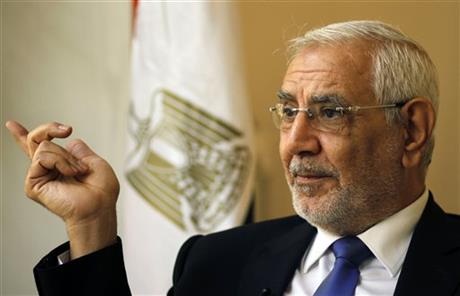
By MAGGIE MICHAEL
Abdel-Moneim Aboul-Fotouh talks during interview with the Associated Press at his home in Cairo, Egypt, Monday, Nov. 18, 2013. Egypt’s reformist Islamist leader Aboul-Fotouh, who defected from the country’s Muslim Brotherhood group and joined mass protests against the now ousted Islamist president Mohammed Morsi, says he was a “failed” president whom people were able to overthrow but military coup and subsequent repression served the group well.(AP Photo/Amr Nabil)
Abdel-Moneim Aboul-Fotouh
Abdel-Moneim Aboul-Fotouh speaks during an interview with Associated Press at his home in Cairo, Egypt, Monday, Nov. 18, 2013. Egypt’s reformist Islamist leader Aboul-Fotouh, who defected from the country’s Muslim Brotherhood group and joined mass protests against the now ousted Islamist president Mohammed Morsi, says he was a “failed” president whom people were able to overthrow but military coup and subsequent repression served the group well.(AP Photo/Amr Nabil)
Abdel-Moneim Aboul-Fotouh
Abdel-Moneim Aboul-Fotouh speaks during an interview with Associated Press at his home in Cairo, Egypt, Monday, Nov. 18, 2013. Egypt’s reformist Islamist leader Aboul-Fotouh, who defected from the country’s Muslim Brotherhood group and joined mass protests against the now ousted Islamist president Mohammed Morsi, says he was a “failed” president whom people were able to overthrow but military coup and subsequent repression served the group well.(AP Photo/Amr Nabil)
Abdel-Moneim Aboul-Fotouh
Abdel-Moneim Aboul-Fotouh speaks during an interview with Associated Press at his home in Cairo, Egypt, Monday, Nov. 18, 2013. Egypt’s reformist Islamist leader Aboul-Fotouh, who defected from the country’s Muslim Brotherhood group and joined mass protests against the now ousted Islamist president Mohammed Morsi, says he was a “failed” president whom people were able to overthrow but military coup and subsequent repression served the group well.(AP Photo/Amr Nabil)
Prev
1 of 4
Next
CAIRO (AP) — A reformist Islamist leader said Monday that Egypt’s army chief should not run for president in next year’s expected election, telling The Associated Press such a move would block transition to democracy.
Abdel-Moneim Abolfotoh, who joined mass protests against now-ousted Islamist President Mohammed Morsi last summer, said that Defense Minister Gen. Abdel-Fattah el-Sissi should not be nominated.
“If the nomination for the contest takes place amid this rabid media campaign, portraying him as a savior and the army as rescuer, we will never move to democracy,” he said in an interview.
“As long as the army leadership insists to remain in the swamp of politics … there will be no democracy,” said Abolfotoh, who quit Morsi’s Muslim Brotherhood group in 2011 and later ran against its will in 2012 presidential elections that Morsi won.
A pervasive personality cult has grown around el-Sissi, who deposed Morsi on July 3, knocking Islamists from power. Calls for him to run for president next year are gaining momentum.
Previously, a military spokesman denied el-Sissi had political ambitions. However in a published interview the newspaper Al-Masry al-Youm last month he left open the possibility.
“I think the time is inappropriate to raise this question in light of the challenges and risks that the country is going through,” he said when asked.
The Egyptian media has fanned pro-military, nationalist sentiment, since the coup, depicting el-Sissi and the army as saviors of the country — further fueling calls for him to run. Pop songs praising him and the military flood the airwaves. Supporters put up images of him in his dark glasses and military cap are around the streets. Videos of el-Sissi addressing troops or training with them have become a TV staple.
The military backed transition plan calls for the amending of the Morsi-era constitution, followed by presidential and parliamentary elections early next year.
“What did Egypt get from the military rule over sixty years? No democracy and no freedom,” said Abolfotoh, referring to the four presidents preceding Morsi, all of whom came from the military.
El-Sissi and the interim government have led an extensive campaign to cripple the Brotherhood, imprisoning its leaders and rounding up thousands of its members. A court also outlawed the group and all branch associations in an effort to break its vast social services network — a pillar of its support at the ballot box.
Abolfotoh believes that repression has only glued the group’s members together.
“The repression of any ideological group makes them stronger,” he said, describing such action as “stupidity” that will backfire. He said that the interim authorities’ heavy crackdown on the Brotherhood is only making it stronger as an organization.
Unlike most in Egypt, who think the Islamist movement is finished, Abolfotoh believes it will eventually return to politics.
Islamists swept the country’s first parliamentary elections after the overthrow of longtime President Hosni Mubarak in a 2011 uprising. Together with ultraconservative Salafis, the Brotherhood won 70 percent of the seats.
Abolfotoh estimates that such a score will not be repeated, although Islamists would maintain substantial support among voters as long as there is no “viable” alternative to them. He forecast they have enough support to win 40 percent of seats in parliament.



